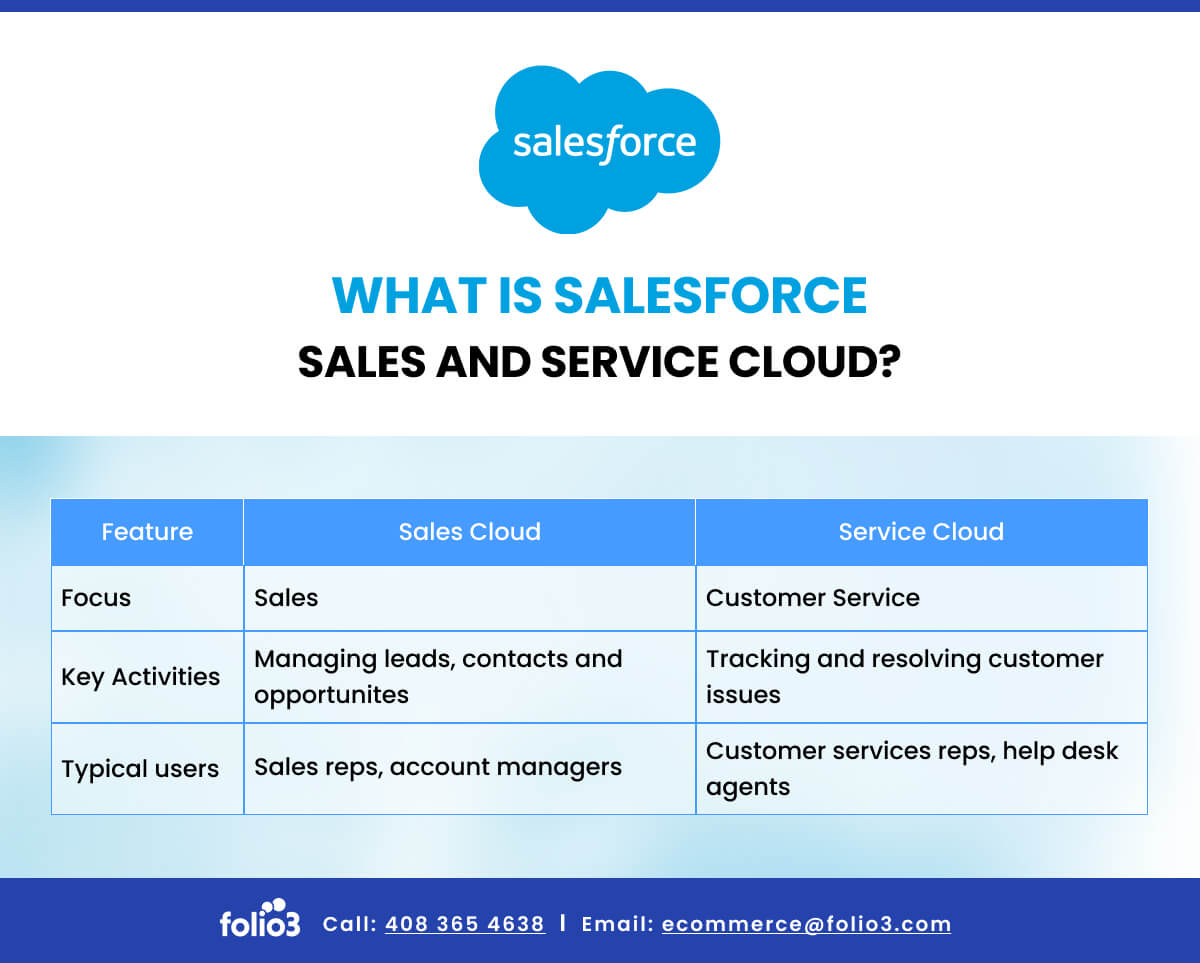Salesforce is a multipurpose dynamic force reshaping how businesses cultivate and nurture customer relationships. At its core, it has two pivotal components, Sales and Service Cloud Salesforce. To optimize your Salesforce experience, consider partnering with a trusted Salesforce Consulting Partner.
What Is The Difference Between Salesforce Sales and Service Cloud?
Sales Cloud
Salesforce Sales Cloud Services, akin to a sales engine, sets its sights on getting new customers. Its toolkit features are lead management, opportunity tracking, quoting, and forecasting.
To be more precise, Salesforce is great at visualizing Sales Cloud as a revenue rocket. Therefore, availing these services means propelling businesses toward new heights of success.
Service Cloud
Service Cloud emerges as the guardian of customer satisfaction. With a sharp focus on retaining existing customers, its duties revolve around customers and their management.
For example, it includes case management, omnichannel support, a knowledge base, and community forums. Calling Service Cloud just a supportive partner would be wrong—they are designed to swoop in and ensure customer satisfaction.
Sales Cloud vs. Service Cloud: Comparison
Salesforce Sales and Service Cloud are two distinct modules within the Salesforce platform, each designed to address specific business needs. Here’s a comparison between Sales Cloud and Service Cloud.
Sales Cloud is primarily designed for managing the sales process, from lead generation to closing deals. It provides functionality to convert leads into opportunities and manage the entire sales pipeline.
For workflow automation, it offers features like workflow rules, process builders, and approval processes to streamline sales processes. Salesforce Sales Cloud Implementation also supports the creation of quotes, tracking contracts, and managing the entire quote-to-cash process.
As for Service Cloud, it is geared toward managing customer service and support operations. Service Cloud facilitates the tracking and resolution of customer issues through a centralized case management system.
To effectively implement Salesforce Service Cloud, businesses often seek professional Salesforce service cloud consultation and implementation services. These services ensure that the platform is tailored to meet specific business needs and integrates seamlessly with existing systems. Salesforce Service Cloud experts can guide through the setup process, customize the interface, and ensure that all features are optimized for maximum efficiency.
It enables the creation and management of a knowledge base to empower customers to find answers independently. It also allows businesses to provide support across multiple channels, including email, social media, chat, and phone.
Another thing about Service Cloud is that it includes features for managing field service operations, dispatching technicians, and tracking service appointments. It integrates with Community Cloud to create customer communities, enhancing collaboration and engagement.
Both Sales Cloud and Service Cloud in Salesforce allow seamless integration with other Salesforce products and third-party applications. Both modules contribute to the 360-degree view of the customer, ensuring a unified experience across sales and service interactions.
Want to Maximize Your Salesforce Investment?
Are you ready to set sail with Salesforce Sales and Service Cloud to take your business to new heights of success? Contact our Salesforce representative today and start charting your course for a profitable sales future.
Sales Cloud vs. Service Cloud: Features Comparison

To comprehend the distinct roles these clouds play, let’s draw a side-by-side comparison:
Salesforce Sales Cloud Features
Its features seamlessly use the prowess of opportunity management and forecasting tools for orchestrating growth. The characteristics expand to showcase the elegance of quote generation and the precision of contract management capabilities.
Salesforce Service Cloud Features
When it comes to Service Cloud, efficiency takes the spotlight with case resolution workflows. It also benefits omnichannel support unfold, providing a harmonious connection between businesses and their clientele. This functionality revolves around self-service knowledge bases and vibrant communities, empowering customers to be integral to the narrative.
Salesforce Sales Cloud and Service Cloud Features Overlap
As we explore the convergence of Salesforce Sales and Service Cloud, it becomes evident that they share common ground in contact and account management. The value amplifies as we uncover the significance of centralized reporting and dashboards, offering businesses a panoramic view of their operations.
This highlights the potential for customization and automation across both platforms, fostering a seamless synergy. Salesforce Sales and Service Cloud are not totally isolated entities; they are interconnected threads contributing to customer-centric success.
Understanding their intricacies equips businesses to harness the power of customer acquisition and retention, where the clouds of Salesforce pave the way for sustained growth and prosperity.
Sales Cloud vs. Service Cloud: Benefits Comparison
After all the features and differences, if anything affects the choices, they are outputs and results.
Salesforce Sales Cloud Benefits
Salesforce Sales Cloud is more than just a CRM platform. Instead, it is powerful enough to transform your sales game. But with so many options out there, why should you choose Sales Cloud? Here are five compelling benefits:
1. Enhanced Visibility
It can be a real-time map of your entire sales pipeline, covering every lead, opportunity, and deal in a detailed manner. That’s the power of Sales Cloud’s centralized data hub. Salesforce lets the sales team keep every interaction logged and organized, providing a 360-degree view of your customer journey.
2. Automate the Tedious, Focus on the Strategic
There is no denying that sales have its fair share of repetitive tasks that consume valuable time. However, Sales Cloud’s automation features free you and your team to focus on useful matters. From launching targeted email campaigns on autopilot to setting up automated follow-ups without hassle, Sales Cloud empowers you to work smarter, not harder.
3. Leveraging the Power of AI
Sales is more than just selling to customers; it’s also about using data to your advantage. The AI capabilities take your sales intelligence to the next level. It uncovers hidden patterns, analyzes your data, and predicts future outcomes. With this AI-powered guidance, you can stay ahead in the race, close more deals, and leave your competitors in the dust.
4. Personalized Engagement
In today’s competitive era, personalization is key. Sales Cloud helps you go beyond generic outreach and tailor your communication to each customer based on their interests and behaviors, like sending targeted emails that resonate and engaging them on their preferred channels.
5. Scalability and Seamless Growth
The sales increase with the growth of the business. Sales Cloud is created to scale with you by offering flexible plans and adaptable features to meet your changing demands. Sales Cloud has every tool and resource you need to achieve your sales goals, whether a small startup or a global enterprise.
Salesforce Service Cloud Benefits
Service Cloud is more than just a help desk; it’s a powerful platform that can create a streamlined experience that delights customers and boosts loyalty. Here are five compelling ways they do their job:
1. Streamlined Case Management
Service Cloud’s centralized case management system acts as your trusty captain. They keep track of every inquiry, request, and complaint. In the Salesforce Service Cloud, cases are prioritized, automatically logged, and assigned to the best agent for the job.
2. Empower Your Crew with Knowledge
Managing abundant knowledge is not easy. Service Cloud’s knowledge base is an onboard library providing answers to common queries, product manuals, and troubleshooting guides. Your sales agents can quickly access relevant information, resolve issues faster, and provide consistent, accurate support to every customer while using Salesforce Services.
3. Multi-Channel Support for Smooth Sailing
Today’s customers seek omnichannel service. It means they want to reach you on their terms through phone, chat, email, or social media. In this case, Service Cloud equips your team with the tools to handle inquiries across all channels.
4. AI to Anticipate Needs and Minimize Friction
Service Cloud’s AI capabilities predict customer issues before they even arise. They can analyze data to identify problems and proactively send automated reminders and even self-service options. This proactive approach reduces friction, prevents escalations, and keeps your customers sailing smoothly.
5. Measure Your Success and Continuously Improve
Data is your compass, and Service Cloud provides you with detailed reports and analytics to track your performance. Together, they can quickly identify issues, resolve them, and identify areas for improvement to increase customer satisfaction. Through this approach, you can continuously refine your course and ensure your customer service team delivers a five-star experience.
Salesforce Sales Cloud vs. Service Cloud: Rating Comparison
Comparing the ratings of Salesforce Sales and Service Cloud can be tricky, as they cater to different objectives and audiences. Here’s a breakdown based on available user reviews and industry recognition:
Salesforce Sales Cloud Ratings
G2: 4.1 out of 5 stars (over 23,000 reviews), ranked #1 in the Sales Force Automation category.
Capterra: 4.0 out of 5 stars (over 1,800 reviews), ranked #1 in the CRM Software category.
GetApp: 8.14 out of 10 (over 300 reviews), ranked #4 in Sales Software category.
Salesforce Service Cloud Ratings
G2: 4.6 out of 5 stars (over 3,800 reviews), ranked #1 in the Customer Service Software category.
Capterra: 4.5 out of 5 stars (over 1,500 reviews), ranked #1 in the Help Desk Software category.
GetApp: 8.75 out of 10 (over 200 reviews), ranked #1 in the Customer Support Ticketing Software category.
How Companies Use Salesforce Sales Cloud and Service Cloud
The choice between Salesforce Sales and Service Cloud depends on their primary goal. Sales Cloud is the better choice if the goal is to generate leads, close deals, and boost revenue. On the contrary, if they focus on providing excellent customer service, quickly resolving, and improving customer satisfaction, Service Cloud is the way to go.
However, there is a third situation where many businesses take advantage of Salesforce Sales and Service Cloud platforms together. It creates a seamless customer experience from initial contact to ongoing support. After all, both platforms aim to customize users’ experience by offering a variety of add-on features.
Final Thoughts
Salesforce Sales Cloud and Service Cloud platforms both excel in their respective categories, each offering strong feature sets and positive user experiences tailored to their specific domains. Service Cloud often receives higher ratings than Sales Cloud, likely due to its strong focus on user experience and customer satisfaction. For those seeking a Salesforce Sales Cloud consultation, understanding this distinction is crucial. A consultation can provide insights into how Sales Cloud can be optimized for your business, ensuring it meets your unique sales needs while leveraging the platform’s robust features.
But it’s essential to consider your primary goal when comparing ratings as the best Salesforce platform for your business depends on your unique needs and goals. By carefully considering your priorities and budget, you can choose the best Salesforce Service Cloud and Sales Cloud platform.
FAQs
What Is the Difference Between Sales Cloud and Service Cloud?
Sales Cloud is geared toward sales processes and managing leads and opportunities, while Service Cloud is designed for customer service, encompassing case management and multichannel engagement.
Does Sales Cloud Come With Service Cloud?
Salesforce Sales and Service Cloud are separate modules. Sales Cloud does not inherently come with Service Cloud; they are distinct offerings that can be implemented individually based on business needs.
What Are the Functions That Are Included in the Service Cloud but Not in the Sales Cloud?
Service Cloud includes functions unique to customer service, such as case management, knowledge base creation, and field service capabilities. These are not present in the Sales Cloud, which is focused on sales processes.

Hasan Mustafa
Engineering Manager Salesforce at Folio3
Hasan Mustafa delivers tailored Salesforce solutions to meet clients' specific requirements, overseeing the implementation of scenarios aligned with their needs. He leads a team of Salesforce Administrators and Developers, manages pre-sales activities, and spearheads an internal academy focused on educating and mentoring newcomers in understanding the Salesforce ecosystem and guiding them on their professional journey.